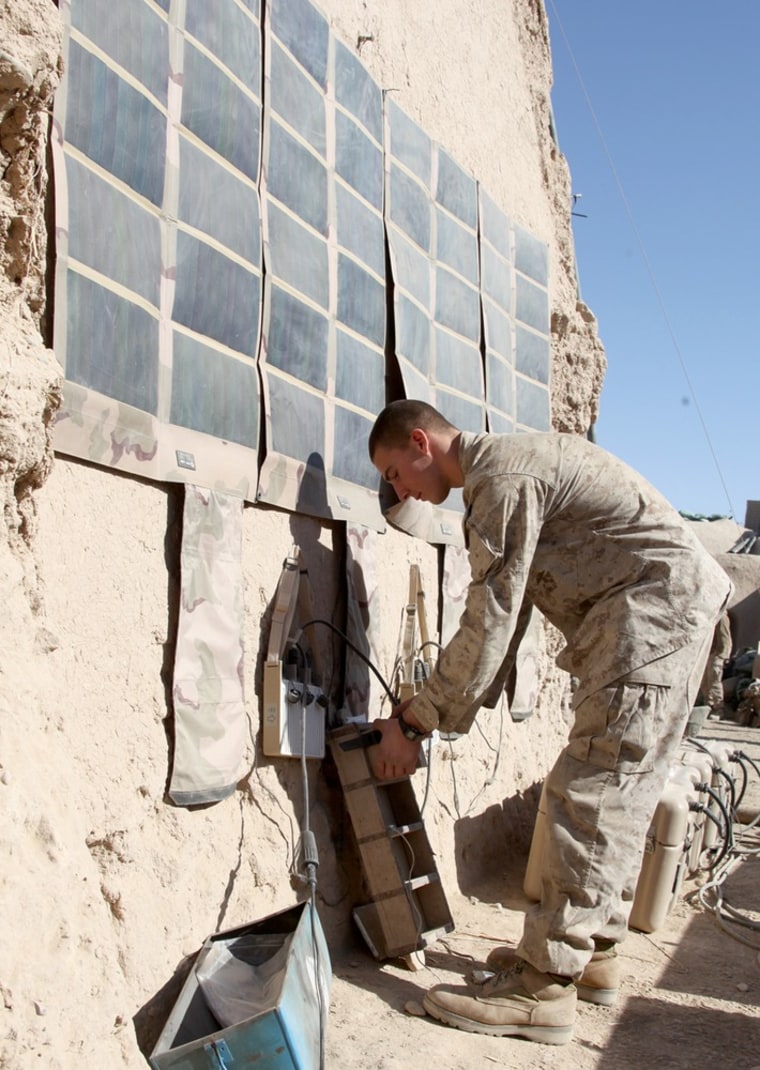The Marine Corps is going green to save lives rather than to save the planet.
In a renewable energy strategy revealed to troops Monday, the service said it plans to equip thousands of Marines in Afghanistan with solar-powered gadgets over the next year in an effort to decrease the need to make risky runs for fuel through enemy territory.
The Marine Corps said the change comes after the service studied a three-month period last year and found that one Marine is wounded for every 50 trips made for fuel or water in Afghanistan.
The strategy also addresses the ongoing problem of U.S. reliance on the questionable practices of private security companies in Afghanistan that are used to protect the convoys. A congressional inquiry last year found that some of those companies have been inadvertently funneling money to the Taliban and threatening the safety of coalition troops because contractors often don't vet local recruits and wind up hiring warlords and thugs.
Trucking contractors who bring in the fuel, mostly from Pakistan, pay tens of millions of dollars a year to local warlords for convoy protection. Marines then truck the fuel from their bases to the smaller outposts.
The green strategy builds on the initial success of a Marine company wrapping up the final weeks of a seven-month deployment to a Taliban stronghold. The unit is equipped with portable solar panels for recharging radios and laptops, and solar-powered generators for running combat operations at its remote outposts.
"The immediate impact is our war fighters are safer today than they were yesterday," said Col. Robert J. Charette Jr., director of the Marine Corps' Expeditionary Energy Office in Washington.
The Corps plans to spend $9 million to equip Marines deployed to Afghanistan with portable solar panels by 2012, he said. It wants to increase the number of solar-powered generators there from nine to 300 by December 2012.
The service is also using PowerShade, a large solar tarp that fits over a standard Marine Corps tent that can quietly power its lighting system without the buzz of a generator that can alert insurgents, and the Ground Renewable Expeditionary Energy System, a solar panel array that can run a platoon-sized command center.
The Obama administration is asking Congress for $41 million to implement the measures next year and proposes investing another $322 million by 2016.
With oil prices soaring, Charette is optimistic Marines will secure the funding amid the budget crunch.
The Marine Corps consumes more than 200,000 gallons of fuel per day in Afghanistan.
For every $10 increase in the price of a barrel of oil, that price rises by an additional $1.3 billion, according to the Pew Project on National Security, Energy and Climate.
The strategy is part of a military-wide goal of reducing the carbon footprint of the single largest U.S. energy consumer. Hundreds of bases are switching to renewable energy while plans are under way for everything from a "green" Navy carrier strike group run completely on alternative fuels to a fleet of electric powered Army vehicles.
With high-tech gear and heavy armored vehicles that get about 4 mpg, the amount of fuel consumed per war fighter has increased more than 175 percent since the Vietnam War alone, according to the Marine Corps.
The corps aims to cut its energy consumption overall in half by 2025.
"The amount of equipment we've acquired throughout the wars in Iraq and Afghanistan has been exponential," 1st Lt. Gregory A. Wolf said. "It has made us more lethal but has made us unsustainable down the road."
In October, the Marine Corps sent in 150 Marines to Afghanistan's toughest area — Helmand Province's Sangin district — with an array of solar-powered equipment, including solar blankets, called Solar Portable Alternative Communication Energy System, or "SPACES," that can be stuffed in a backpack.
The troops were told to use the panels to charge their radio batteries. But once deployed, they learned the panels could be used for other equipment.
They also installed solar-powered generators, and have been able to run two of patrol bases without needing to truck in fuel since October, Charette said. Such outposts before would need to make fuel runs at least every month.
The Marine Corps now is asking private industry to develop even smaller, more efficient solar power technologies to help the force become more agile.
